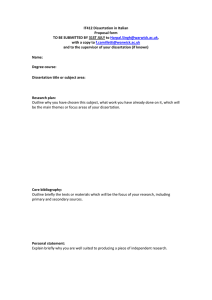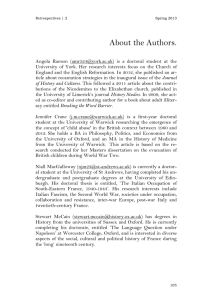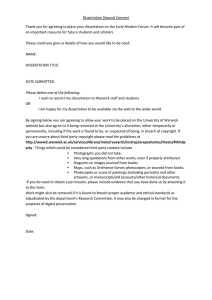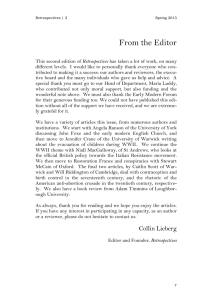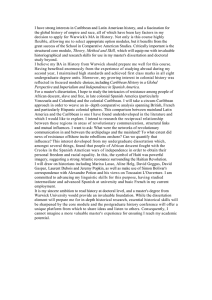About the Authors
advertisement
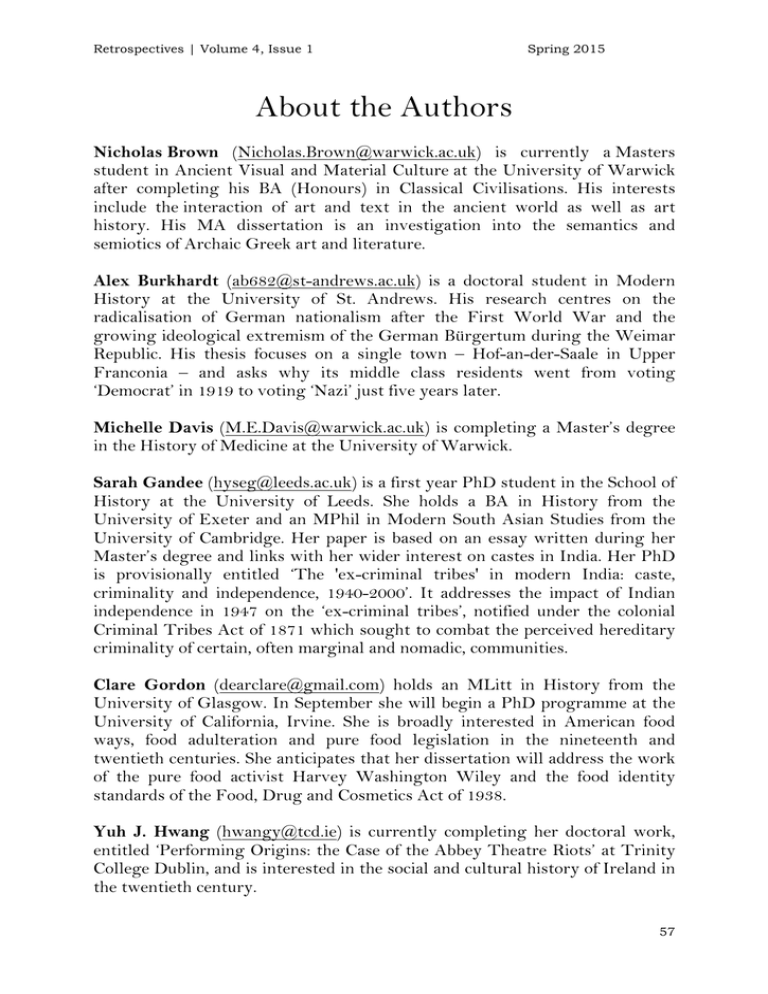
Retrospectives | Volume 4, Issue 1 ! ! Spring 2015 About the Authors Nicholas Brown (Nicholas.Brown@warwick.ac.uk) is currently a Masters student in Ancient Visual and Material Culture at the University of Warwick after completing his BA (Honours) in Classical Civilisations. His interests include the interaction of art and text in the ancient world as well as art history. His MA dissertation is an investigation into the semantics and semiotics of Archaic Greek art and literature. Alex Burkhardt (ab682@st-andrews.ac.uk) is a doctoral student in Modern History at the University of St. Andrews. His research centres on the radicalisation of German nationalism after the First World War and the growing ideological extremism of the German Bürgertum during the Weimar Republic. His thesis focuses on a single town – Hof-an-der-Saale in Upper Franconia – and asks why its middle class residents went from voting ‘Democrat’ in 1919 to voting ‘Nazi’ just five years later. Michelle Davis (M.E.Davis@warwick.ac.uk) is completing a Master’s degree in the History of Medicine at the University of Warwick. Sarah Gandee (hyseg@leeds.ac.uk) is a first year PhD student in the School of History at the University of Leeds. She holds a BA in History from the University of Exeter and an MPhil in Modern South Asian Studies from the University of Cambridge. Her paper is based on an essay written during her Master’s degree and links with her wider interest on castes in India. Her PhD is provisionally entitled ‘The 'ex-criminal tribes' in modern India: caste, criminality and independence, 1940-2000’. It addresses the impact of Indian independence in 1947 on the ‘ex-criminal tribes’, notified under the colonial Criminal Tribes Act of 1871 which sought to combat the perceived hereditary criminality of certain, often marginal and nomadic, communities. Clare Gordon (dearclare@gmail.com) holds an MLitt in History from the University of Glasgow. In September she will begin a PhD programme at the University of California, Irvine. She is broadly interested in American food ways, food adulteration and pure food legislation in the nineteenth and twentieth centuries. She anticipates that her dissertation will address the work of the pure food activist Harvey Washington Wiley and the food identity standards of the Food, Drug and Cosmetics Act of 1938. Yuh J. Hwang (hwangy@tcd.ie) is currently completing her doctoral work, entitled ‘Performing Origins: the Case of the Abbey Theatre Riots’ at Trinity College Dublin, and is interested in the social and cultural history of Ireland in the twentieth century. 57 Retrospectives | Volume 4, Issue 1 Spring 2015 ! ! Rachel Peat (rachel.peat@kcl.ac.uk) is a Master’s student on the World History and Cultures programme at King’s College London, where she holds the Daniel Peltz Scholarship for Academic Achievement. Her research interests span material and visual history, with a particular emphasis on nineteenth-century articulations of empire in the British context. In this vein, she is currently completing a dissertation on the ways that the London Missionary Society’s colonial artefact museum reflected and influenced contemporary discourses of empire, anthropology and materiality between 1814 and 1910. She holds a BA in History from St John’s College, Cambridge, where she was three-time recipient of the Whytehead Scholarship and winner of the Larmor Award for Academic Excellence. Yvonne Seale (yvonne-seale@uiowa.edu) is a Presidential Graduate Fellow of the University of Iowa and a doctoral candidate in the university's Department of History. She holds a BA (Hons) in History and Archaeology from Trinity College, Dublin, and an MLitt in Mediaeval History from the University of St Andrews. Her dissertation, ‘“Ten Thousand Women”: Gender, Affinity, and the Development of the Premonstratensian Order in Medieval France’, uses women’s involvement in a medieval monastic order to explore issues of agency and the gendered use of power and authority. 58
